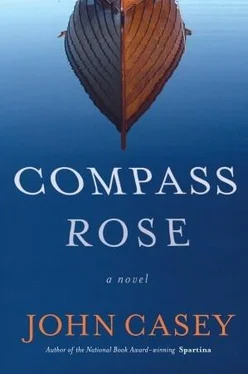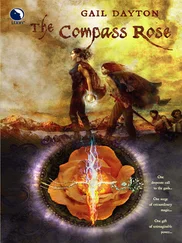When she was through, he swung away from her in his swivel chair. “Let me think about it. If it were just up to me … I can see how you feel, I really do. But look, for right now you’ve got a lot of sick leave.”
She said, “Yes, but I’m not sick.”
She told all this to Sally, not as a problem but just to let Sally know her state of mind. But Sally told Jack, and Jack called her up. “Oh, for God’s sake, Elsie, I’ll take care of it. You’ve got enough to do.”
“Jack, you don’t understand. I don’t want some backdoor deal. I can’t explain—”
“I do understand. You always think I don’t understand when in fact I have a perfectly clear understanding. Miss Perry needs you, she has no one else, and now some little time-server behind a sheet-metal desk … That’s who doesn’t understand.” Jack was getting so loud that Elsie held the phone away from her ear.
“ Fiat justitia, ruat caelum. ”
There was no talking to Jack when he got to Latin. Elsie said, “Could you put Sally on?”
But Sally’s line was that Jack was more upset about Miss Perry than he let anyone see, and why not let him feel better by letting him do something? She’d be sure he didn’t do anything that hurt anyone’s feelings. “I know he sounds furious, but he’s really very temperate when he’s actually doing something.”
Elsie let it go.
She apologized to her boss when he handed her the approved leave request. “I really didn’t ask anyone to poke in; I tried to head it off.”
“No, it’s okay,” he said. “I’m off the hook. They worked it out up in Providence, CCed me on a memo in legalese. You know, ‘Immediate family may be considered to include another relationship if in the judgment of the office of the attorney general …’ and so forth and so on. So I’m okay, you’re okay. Sorry. I didn’t mean … I just meant okay as far as this goes. I’m sorry for your trouble.”
Elsie was about to say, “No trouble,” but she recognized the phrase from a Mary Scanlon story. “I’m sorry for your trouble” was the canonical Irish condolence at a wake.
She became calmer and more careful, not by an act of will but by the continued emanation of that moment in Miss Perry’s bedroom. It was strongest when she was in Miss Perry’s house, but it had also worked just now to make her softer with her boss.
When Rose climbed onto Mary’s bed, Mary was having a musical dream or had just had a musical dream. The notes were all over the room, the room in her dream, the room she was in, the bed she was in, the bed that listed toward Rose. The notes faded in the sunlight that was blinking in her face.
Rose laughed. Mary tried to hum and made a sound that made Rose laugh again. Mary cleared her throat and half opened her eyes. Green leaves were stirring outside the window, not in time with the song.
It wasn’t that she woke up not knowing where she was — there was no wall or window off by ninety degrees waiting for wakefulness to swing it into place like a compass needle. It was that she didn’t know when . She was fogbound in time, among wisps of songs she’d sung to Rose. The one that was fading in the light might have been one of them. Now she heard a bar or two from Rose’s baby days—“Where Is Thumbkin?”; “Hush, Little Baby, Don’t You Cry”—but then a Cole Porter medley—“You’re the Top,” “Let’s Do It, Let’s Fall in Love”—that was too racy for baby Rose. Then, passing through in a single breath, a complete stanza of a sailor’s hornpipe.
And when we get to the Black Wall docks
Them pretty young girls come down in flocks ,
And one to another you can hear ’em say ,
“ Here comes Jack with his twelve months’ pay. ”
When was that? Toddler Rose? Tomboy Rose? Plump, moody Rose? It would be moody Rose who liked Cole Porter, who liked Gershwin’s difficult intervals because she had an ear and Elsie didn’t. Was it in a dream that Rose sang “Stardust” so it broke your heart?
This was making it harder for Mary, her own songs mixing with Rose’s. But then something simpler — Rose surprising Mary by clinking out a tune on her toy xylophone, “You Are My Sunshine,” from beginning to end. Surely that was memory, the way Mary heard it now, heard it melt into “Red River Valley,” heard herself singing and Rose joining in.
… do not hasten to bid me adieu ,
Just remember the Red River Valley
And the cowboy who loved you so true .
Herself singing the Welsh lullaby “Sleep my child and do not waken, all through the night,” and little genius Rose breaking into “Men of Harlech.” And quite right. It was nearly the same tune quickened into a marching song. It was tomboy Rose who liked a good march — she speeded up Mary’s “Goodnight, My Someone” into “Seventy-six Trombones.” She wouldn’t be one to sit still for moonlight and roses. But then hadn’t she made all the Teixeira women, and some of the men, weep when she sang “Ave Maria” at Sylvia’s wedding? Had that really happened? Each note pure, the phrasing as easy and sweet as a brook curling over a rock.
Was that the music in her dream? Was her dream one of those dreams that trailed on into waking, letting the dreamer undream gently, measure by measure? Mary didn’t want to turn her head. She’d turn her head and find a little girl who hadn’t learned the songs Mary had sung to her, who hadn’t taken on Mary’s ear or voice or even that bit of meat on her bones.
She turned her head. Rose put her hand on Mary’s shoulder and sang “Lazy Mary, will you get up, will you get up, will you get up? Lazy Mary, will you get up, will you get up this morning?” Mary felt the weight of Rose’s hand, looked up at Rose’s arm, bare to the shoulder of her summer dress, an arm as round and full as her own. The dress was Elsie’s.
“Mom called,” Rose said. “Miss Perry wants johnnycakes.”
The sunlight from the window covered the wall behind Rose with leaf shadows. Mary said, “What time is it?”
“It’s nine. I called Sawtooth and they’ve got the brunch thing covered. Mom says she’s sorry but Miss Perry hasn’t been eating and she just woke up and said johnnycakes.”
Now Mary was truly waking up and it was as good a place to start as any, someone wanting something for breakfast. And did Miss Perry like her johnnycakes plump and soft or thin and lacy at the edges?
Then Mary was awake to the pattern of the day ticking back into place from the day before: Elsie caring for Miss Perry as she had for years but this time more haggard and dazed by a stronger tug of grief. And there would be Dick, Captain Teixeira, Jack and Sally … Dick and Captain Teixeira standing by with silent, tight faces — they had sent their boats out without them, not uncommon for Captain Teixeira, a first for Dick. Elsie had turned snappish. Snappish with Jack, of course, but with Sally and Rose, too. Never mind — she’d be good with the old woman.
Thinking about Miss Perry’s johnnycakes or even thinking about these people who moved in the same bit of earth as she did, the strip between the hills and the salt water, was no more than a tilt of her head, a shallow breath, away from dreaming.
She touched Rose’s hand, her arm, her shoulder. “Come on,” Rose said. “You know how Mom is these days.”
Mary thought it might be time to leave this house. This wasn’t baby Rose or tomboy Rose or even plump, moody Rose. Rose was wearing Elsie’s dress. If Mary stayed she’d be in between Rose and Elsie. The more Mary loved Rose and Rose loved Mary, the harder it would be. Elsie and Rose were locked in their growing apart — it had to happen for a while at least, and the ease and comfort Mary could give to Rose couldn’t be given in this house.
Читать дальше












